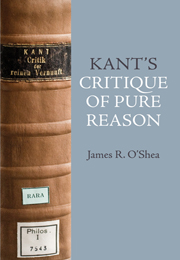Book contents
- Frontmatter
- Contents
- Preface
- INTRODUCTION
- 1 METAPHYSICS AND THE “FIERY TEST OF CRITIQUE”
- 2 WAKING FROM DOGMATIC SLUMBERS: HUME AND THE ANTINOMIES
- 3 SPACE AND TIME AS FORMS OF HUMAN SENSIBILITY
- 4 THE CATEGORIES OF UNDERSTANDING AND THE THINKING SELF
- 5 ONE LAWFUL NATURE
- 6 CONCLUSION: PURE REASON'S ROLE IN KANT'S METAPHYSICS OF NATURE
- Bibliography
- Index
5 - ONE LAWFUL NATURE
- Frontmatter
- Contents
- Preface
- INTRODUCTION
- 1 METAPHYSICS AND THE “FIERY TEST OF CRITIQUE”
- 2 WAKING FROM DOGMATIC SLUMBERS: HUME AND THE ANTINOMIES
- 3 SPACE AND TIME AS FORMS OF HUMAN SENSIBILITY
- 4 THE CATEGORIES OF UNDERSTANDING AND THE THINKING SELF
- 5 ONE LAWFUL NATURE
- 6 CONCLUSION: PURE REASON'S ROLE IN KANT'S METAPHYSICS OF NATURE
- Bibliography
- Index
Summary
All true metaphysics is drawn from the essence of the faculty of thinking itself.
(Kant, MFNS, 187=4:472)The fall of a stone, the motion of a sling, resolved into their elements and the forces manifested in them and treated mathematically, produced at last that clear and henceforth unchangeable insight into the structure of the world which, with continued observation, one can hope will always be extended while one need never fear having to retreat.
(Kant, Practical Reason, 270=5:163)APPLYING CATEGORIES TO THE WORLD IN THE PRINCIPLES OF PURE UNDERSTANDING
Let us begin our explanation of Kant's Principles of Pure Understanding with a partial formulation of the result of the Transcendental Deduction in terms of the following conditional. This conditional expresses Kant's idea, discussed in the previous chapter, that the categories are shown to be objectively valid in so far as they are shown to be conditions that are necessary for the possibility of experience:
Experience is possible only if the categories are objectively valid. (The Deduction)
With respect to the left-hand side of this conditional, in the previous chapter we saw that Kant's analysis of what is to be meant by ‘experience’ is conducted from several different directions, but in particular it involved the concept of an object of sensory experience for a potentially self-aware experiencer. With respect to the right-hand side, we saw that the categories succeed in representing an objective world by being rules or laws that determine what is necessary and possible for the objects that are thereby represented.
- Type
- Chapter
- Information
- Kant's Critique of Pure ReasonAn Introduction and Interpretation, pp. 158 - 204Publisher: Acumen PublishingPrint publication year: 2011

